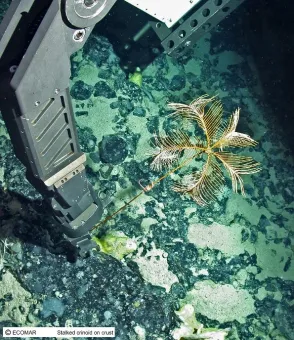
Exploration and potential future exploitation of marine minerals is an emerging field to ensure future access to raw materials for low carbon industries.
It attracts high-technology, autonomous, low-impact, and remotely-operated solutions that allow for environmentally sustainable exploration, exploitation and monitoring. It is in this context that the International Seabed Authority (ISA) and the National Oceanography Centre (NOC) decided to collaborate on hosting an Expert Group Workshop to inform future policy.
This partnership was initiated with the preparation by the NOC of a background document, summarising the main relevant and emerging technologies for deep-sea exploration and marine scientific research. This document laid the foundations for the organisation of an expert scoping meeting on advancing marine technology in support of the sustainable development of mineral resources of the Area. Accordingly, the meeting was held on 2–4 November 2021, and was designed with a view to promote targeted research activities and dialogues among experts within the relevant fields. In particular, the focus was on technology development strategies that can effectively support the effective implementation of Part XI of UNCLOS and the 1994 Agreement.
Major contributions were made by Leigh Storey, NOC’s Associate Director, National Marine Facilities, who facilitated a session on Net-Zero Carbon, Dr Daniel Jones, NOC's Associate Head, Ocean BioGeosciences, who facilitated a session on Autonomy, Prof Bramley Murton, NOC’s lead of the Marine Mineral Research team, who presented an overview of technologies currently available for exploration and exploitation, and Alan Evans, NOC's Head of Marine Policy, who co-chaired the meeting. The meeting was deemed a success and a significant milestone in support of the ISAs Strategic Plan and High-Level Action Plan for 2019-2023, the ISA Marine Scientific Research Action Plan in support of the objectives of the UN Ocean Decade and the ISA’s approach on capacity development, all of which help deliver the ISAs duty to ensure the effective protection of the marine environment from harmful effects that may arise from deep seabed related activities.